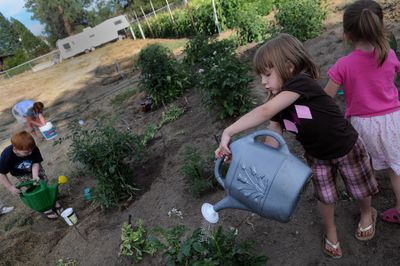Learning language of gardening
Spanish class at Villa Vista blends lessons with farming

Students at Villa Vista Language Academy are learning more than another language. The Spanish-language immersion school, in partnership with a community gardening project called Green Jazz Gardens, has been teaching its students the merits of organic farming through each student maintaining a small garden plot. The school hopes to eventually be able to grow a surplus of vegetables to be donated back to the community.
Laura Hamilton, director of the North Side school, wanted to not only teach her students about gardening, but to give them a real, tangible experience with the activity “so they could have that sensory experience,” she said.
The school had a large backyard perfect for a garden. Don Hanson, husband of the school’s main teacher, Fanny Hanson, was interested in helping Hamilton develop the land.
“For years I’ve wanted to garden,” he said. Hamilton and Don Hanson worked together to develop the project for the preschoolers and kindergartners. Don Hanson installed irrigation systems and also helped till the soil.
The students received seedlings in the spring and tended to a small plot with four different vegetables: potatoes, tomatoes, peas and carrots. Don Hanson planted a variety of other vegetables on the remaining land, including corn, broccoli, cucumbers, spinach and squash.
The students maintain their gardens during the summer and will get to harvest and take home their vegetables when they are ripe. While she is not certain whether they will have a surplus this year, Hamilton hopes that in the future the students’ plants will yield enough vegetables so that whatever the students don’t take home can be somehow donated to the community.
“Next year, we are planning to be bigger so we can have a lot more vegetables,” Hamilton said.
In addition, Don Hanson has dreams of turning his part of the garden, called Green Jazz Gardens, into a community garden. He has planted raspberry bushes and hopes to be able to allow people from the community to pick their own raspberries for a small fee; he hopes to have the raspberry bushes ready sometime next year.
Currently, he has a variety of organically grown vegetables available for purchase. He says anyone is welcome to stop by and purchase some if they see he is out in the garden. “If I’m around, feel free to come in,” he said. He promises to always offer a fair price.
“I think this is important,” Don Hanson said of the garden project. Much of his family was active in farming when he growing up, and his time in the Peace Corps also gave him an appreciation for people who live off their own land.
He views his involvement in the students’ gardens as a way of instilling this appreciation in youth. “It helps kids understand the value of gardening,” he said.
“It’s amazing,” Andrea Baker said of her child’s involvement. “I’ve watched (Hamilton) start … doing the garden. (It’s impressive) to see what it’s become.”
“I like it a lot,” said Baker’s 5-year-old son, Alex.
“I think it’s incredible they’re having so much fun … just being outside and seeing how life works,” said Dawn Kight, whose two daughters attend the school.
Fanny Hanson is originally from Honduras and related the garden to her experiences as a child. “I grew up in Honduras. They incorporate (gardening) as one of the classes. You learn to grow your own vegetables and appreciate them,” she said.
“The kids love it. We’d go every day to water, see how they were growing,” she said. Fanny Hanson also felt the kids were learning vital lessons about organic farming. “I think it’s important for the world,” she said.